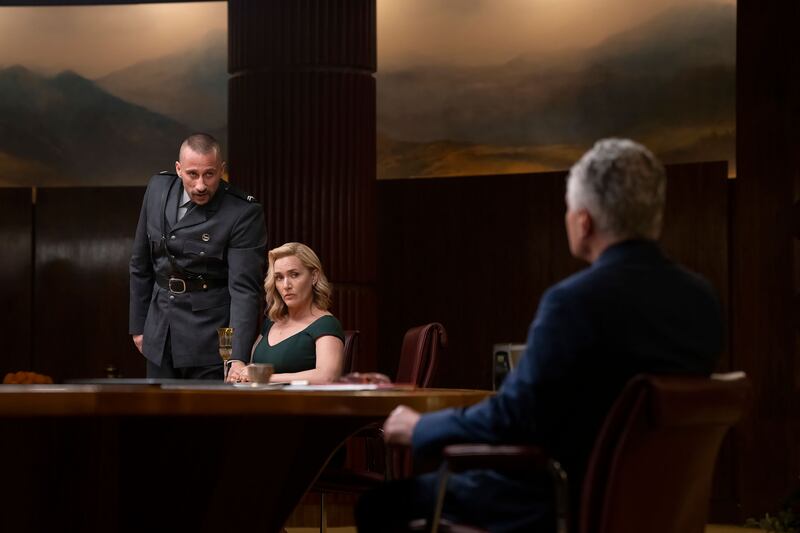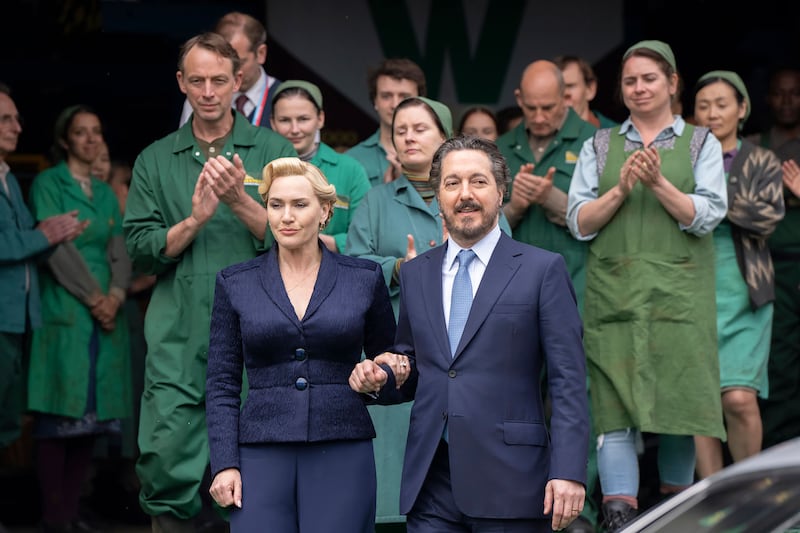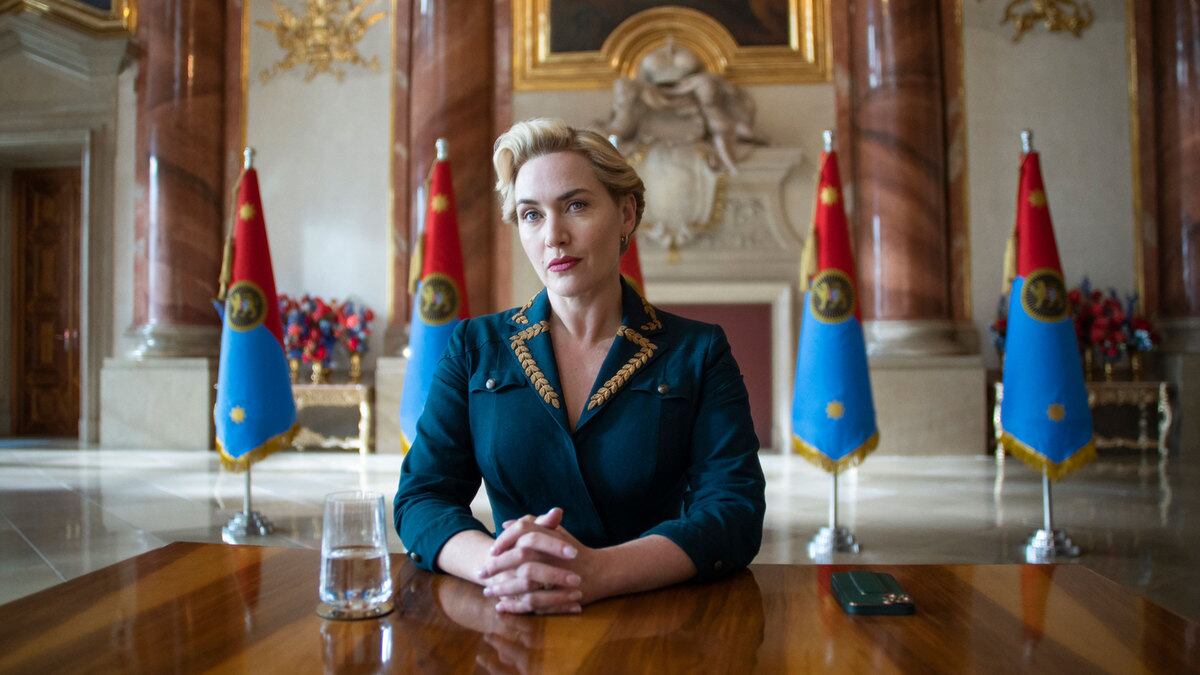From the moment that Kate Winslet comes into the frame in the first episode of HBO’s new limited series The Regime (premiering March 3), it’s evident that the actress is three-for-three at the premium cable network. Her previous HBO series, Mildred Pierce and Mare of Easttown, established Winslet as more than capable of wading into long-form narratives, and in ways that she couldn’t under the constraints of dramatic filmmaking. She excels at dredging up her characters’ finer details gradually to create complete pictures of real people. In her latest role as Elena Verham, the supreme leader of a nameless European autocracy, Winslet gets closer to the truth than ever as a cheek-sucking chancellor with a nasty penchant for alienating everyone inside and outside of her palace’s walls.
If you’ve paid attention to the news in the last two decades, you may think you know Elena. And, to be fair, those with a head for international affairs will recognize different shades of political leaders in Winslet’s performance. There are notes of China’s Xi Jinping, echoes of North Korea’s Kim Jong Un, and a thick ladle of our very own former (knock on wood) President Donald Trump all over The Regime. Though Winslet’s character may be a clever amalgamation of these and other similar leaders, Elena stands all on her own—as both a fictional character and within Winslet’s career. In her three decades as an actor, Winslet has never had such a caustically funny role to chew on, and The Regime’s bold, bizarre satire is the perfect avenue for her to prove that even a flourishing career can benefit from a daring left turn.
The specifics about the country where The Regime takes place are kept intentionally murky by showrunner and writer Will Tracy, who most recently co-wrote another send-up of power dynamics (though one a bit less keen), The Menu. Tracy’s vague scene-setting encourages viewers to envision a little bit of every authoritarian rule within his whacked-out vision. It’s a decision that makes it even easier for viewers to see how a country can fall into the wrong state in the right hands. The most powerful people don’t always appear so imposing but, rather, as bumbling idiots whose heads are about to fly off their necks at any moment.
That much is certainly true for Elena, who has more neuroses than she does policies. At the start of the series, Elena has become consumed by her paranoia that her weak lungs are failing due to a growth of mold in the palace walls. The fear has become so overwhelming that she can barely focus on her country’s bustling exports, cobalt and sugarbeets. That just won’t stand—especially given that the cobalt industry is facing a potential worker uprising after guards shot 12 protestors dead at one of the mining sites for speaking up about their poor working conditions. So, like any politician looking to solve a problem quickly rather than carefully, Elena kills two birds with one stone.
Enter Corporal Herbert Zuback (Matthias Schoenaerts), one of the guards accused of starting the massacre at the mine. Herbert is plucked from his role to be Elena’s humidity monitor. He will lead her through the vast palace and measure the moisture in every room so the spores don’t compromise her lungs. It’s the first of many roles that Herbert—whom the palace staff call “Butcher,” both behind his back and to his face—will play for the chancellor. Herbert’s most important job, the one he feels called to do, is to pull his country’s great leader out of the dreariness of her mind and into the present. It’s a simple task, given the towering sexual tension that stands between the chancellor and her hunky manservant. But it’s when Herbert convinces Elena that she’s not sick, but is being poisoned by her loyal staff, that trouble really begins.

Tracy is devilishly good at finding new and increasingly odd ways for Herbert and Elena to collaborate, despite the prying eyes of her husband (Guillaume Gallienne) and the palace’s manager, Agnes (Andrea Riseborough). The dastardly duo makes for a highly appealing pair thanks to Winslet and Schoenaerts’ electric chemistry. Their mutually destructive nature is a riot to watch unfold, like a psychopathic tornado that sucks up and spits out everyone and everything in its path. Even when their personalities diverge, it’s fascinating to watch the ways that the show accentuates Elena and Herbert’s inherent differences, both in their socioeconomic status and job titles. Herbert watches Elena, bewildered, when she gets on stage in front of her public to celebrate the first healthy sugarbeet of the season, holding a root vegetable like it’s Punxsutawney Phil while wearing a skin-tight jersey fabric jacket-dress.
Winslet is almost too good in too many ways to count in The Regime, especially in these scenes that demand her character confront the public and put on a brave, cheerful face. She is so terrific at being a complete and utter oaf that one has to wonder why Winslet has taken on so few major comedic roles. But no matter—why not save those brilliant comic chops for a character as finely tuned and memorable as Elena? Winslet’s timing is pin-sharp and calculated; each line sounds like she just spat it out off the cuff, though it was no doubt rehearsed thoroughly with Elena’s signature manner of speaking. Because she’s reluctant to breathe in anyone else’s air, the chancellor speaks out of one side of her mouth, and the effects are so instantly singular to this character that Elena arrives in the premiere feeling as though she’s already a beloved figure in the television pantheon.
Elena’s inability to speak like a normal person, let alone in front of children (whom she can barely stand the sight of), is hysterical—particularly in the series’ fourth episode, out of six total. It also makes the dissonance between what Elena says to her country and the reality of her crumbling chancellorship happening within the palace walls even funnier. Winslet is so damn good at playing bad that Elena’s constant string of horrible decisions will make viewers throw their hands in the air, just wishing that she’d use her head for once. Elena’s rule feels like Veep-meets-The Hunger Games, and it’s just as twisted as that fusion sounds. Rarely have I wished a limited series could extend past its initial run, but in the case of The Regime, I’m willing to make an exception.

A series this enterprising can’t succeed on every front. Andrea Riseborough is criminally underutilized, especially given that this is her first role after her Oscar nomination upset last year. But the show’s sheer confidence and stylish execution are enough to look past its few faults—which would likely be how Elena hopes her country sees her, so it’s fitting. The Regime dresses up fairly simple political conversations to make them look just complicated enough not to lose any viewers.
Those looking for Succession-style density here will have to keep searching. But that doesn’t mean that The Regime isn’t clever. This is one of the shrewdest and most unexpected affairs that HBO has pursued, and under the rule of Winslet’s manic genius, audiences should flock to its wacky wits in droves.






